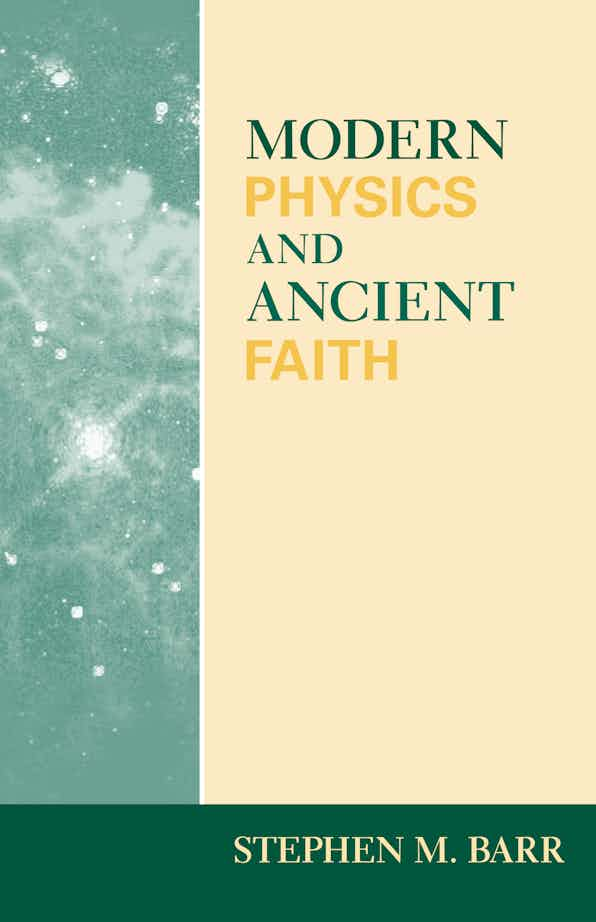Modern Physics and Ancient Faith by Stephen M. Barr

(South Bend: University of Notre Dame Pess, 2003), 328
Part I: The Conflict between Religion and Materialism (Introduction)
Chapter 1: Religion and Materialism
- the battle is not between religion and science, but between religion and materialism (1)
- this chapter gives an overview of the materialist's position
Chapter 2: Materialism as Anti-Religious Mythology
- continues to summarize the materialist's position and show the extent to which is relies on a faith of its own
- separation of realms between the natural and supernatural
- discussion of mystery (14+)
- "A religious 'mystery' is not a statement that reality is in itself unintelligible. On the contrary, belief in God is bound up with the idea that reality is completely rational and intelligible. This is akin to the scientist's faith that his own questions about the natural world have rational and intelligible answers. This attitude of the scientist is also a form of faith, for the scientist is convinced in advance that the intelligible answer exists, even though he is not yet in possession of it." (14)
Chapter 3: Scientific Materialism and Nature
- discusses the scientific materialist's view on nature, and responds
- provides a summary of the book:
- Big Bang and the beginning of time (chapters 4-8)
- The Argument from Design (chapters 9-13)
- Anthropic Coincidences (chapters 14-18)
- Is the mind a computer? (chapters 19-23)
- Free will, determinism, and quantum mechanics (chapters 24-26)
He concludes this chapter with two great anecdotes about intellectual discovery:
- "G.K. Chesterton (in Orthodoxy) once compared his own intellectual development to the voyage of an English yachtsman 'who slightly miscalculated his course and discovered England under the impression that is was a new island in the South Seas.' The Yachtsman of his story 'landed (armed to the teeth and talking by signs) to plant the British flag on that barbaric temple which turned out to be the Pavilion at Brighton.'" (28)
- "We shall not cease from exploration and the end of all our exploring will be to arrive where we started and know the place for the first time." - T. S. Eliot, Four Quartets, "Little Gidding"
Part II: In the Beginning
Chapter 4: The Expectations
Chapter 5: How Things Looked One Hundred Years Ago
Chapter 6: The Big Bang
The Discovery of the Big Bang
Attempts to Avoid the Big Bang
The Big Bang Confirmed
Chapter 7: Was the Big Bang Really the Beginning?
The Universe in the Standard Big Bang Model
The Bounding Universe Scenario
The Baby Universes Scenario
The Eternal Inflation Scenario
Chapter 8: What If the Big Bang Was Not the Beginning?
Part III: Is the Universe Designed?
Chapter 9: The Argument from Design
The Cosmic Design
Two Kinds of Design
Chapter 10: The Attack on the Argument from Design
Pure Chance
The Laws of Nature
Natural Selection
Chapter 11: The Design Argument and the Laws of Nature
Two Ways to Think about Laws of Nature
In Science, Order Comes from Order
In Science, Order Comes from Greater Order
An Example Taken from Nature: The Growth of Crystals
The Order in the Heavens
Chapter 12: Symmetry and Beauty in the Laws of Nature
Chapter 13: "What Immortal Hand or Eye?"
The Issue
Can Chance Explain It?
Is Natural Selection Enough?
Does Darwin Give "Design without Design?"
Part IV: Man's Place in the Cosmos
Chapter 14: The Expectations
Chapter 15: The Anthropic Coincidences
Chapter 16: Objections to the Idea of Anthropic Coincidences
The Objections
Answers to the Objections
Chapter 17: Alternative Explanations of the Anthropic Coincidences
The Weak Anthropic Principle: Many Domains
The Weak Anthropic Principle: Many Universes
The Weakness of the Weak Anthropic Principle
The Problem with Too Many Universes
Chapter 18: Why Is the Universe So Big?
How Old Must a Universe Be?
How Big Must a Universe Be?
Are We Really So Small?
Part V: What Is Man?
Chapter 19: The Issue
The Religious View
The Materialist View
Clearing Up Some Confusions
Chapter 20: Determinism and Free Will
The Overthrow of Determinism
Quantum Theory and Free Will
Is Free Will Real?
Chapter 21: Can Matter "Understand"?
Abstract Understanding
What are Abstract Ideas?
Truth
If Not the Brain, Then What and How?
Chapter 22: Is the Human Mind Just a Computer?
What a Computer Does
What Gödel Showed
The Arguments of Lucas and Penrose
Avenues of Escape
Chapter 23: What Does the Human Mind Have That Computers Lack?
Can One Have a Simple Idea?
Is the Materials View of the Mind Scientific?
Chapter 24: Quantum Theory and the Mind
The London-Bauer Argument in Brief
Going into More Detail
Is the Traditional Interpretation Absurd?
Chapter 25: Alternatives to Traditional Quantum Theory
Modifying Quantum Theory
Reinterpreting Quantum Theory: The "Many-Worlds" Idea
Chapter 26: Is a Pattern Emerging?
Topic: Faith and Science
Source: Read in preparation for a lecture at U. Cincinnati that I was unable to attend.
Bibliography
file:(2018-02-19-Modern Physics and Ancient Faith)
New Words
- apodictic: clearly established or beyond dispute (16)
Created: 2018-02-19
Updated: 2023-11-20-Mon